- Home
- Hammond Innes
Air Bridge Page 2
Air Bridge Read online
Page 2
I looked slowly round the room. The iron bars, the locked door, the removal of my shoes—he knew all right.
My hand groped automatically for my cigarette-case. My jacket hung over the back of a chair and as I felt for the case, my fingers touched the inside breast pocket. It was empty. My wallet was gone.
I found the case and lit a cigarette. And then I leaned back. That wallet had contained something more important than money—it had contained my pilot’s certificate and my false identity. Hell! He’d only to read the papers … I dragged at my cigarette, trying to think through the throbbing ache of my head. I had to get out of here. But how? How? My eyes roved desperately over the room. Then I glanced at my watch. It was eight-fifteen. Probably the papers had arrived already. In any case he would have phoned the police.
A door slammed somewhere beyond the brickwork of the walls. I sat up, listening for the sound of footsteps. All I could hear was the beating of my heart and the buzzing of a fly trapped in a web at the corner of the window. Nobody came. Time passed slowly. Occasionally I heard the sound of movement somewhere in the depths of the building. At eight thirty-five a car drew up at the back. There was the slam of a door and then the sound of voices. Five minutes later the car drove off.
I couldn’t stand it any more. The feeling of impotence was getting on my nerves. In a sudden mood of anger I got up and beat on the panels of the door. Footsteps approached, a heavy, solid tread, boots ringing metallic on concrete. Then a voice asked, “Are you awake?”
“Of course I’m awake,” I replied angrily. “Do you mind opening the door?”
There was a moment’s pause and then the voice said, “That depends. I’m a bit cautious after last night. You damn nearly throttled me.”
I didn’t say anything and a moment later the key turned in the lock and he opened the door. It was the same man all right—short and broad and very solid. He had thick dark hair slightly grizzled at the temples and a wide jaw that seemed to compress his lips into a thin, determined line. He was dressed in oil-stiff overalls and the silk scarf round his neck didn’t entirely hide the livid marks left by my fingers.
“I’m sorry—about last night,” I murmured.
He didn’t come in, but stood there in the gap of the doorway, his legs slightly straddled, staring at me. He had hard, slate-grey eyes. “Forget it.” His voice was more friendly than his eyes. “Have you had a look at yourself in a mirror? Afraid I made a bit of a mess of your jaw.”
There was an awkward silence. Somehow I couldn’t bring myself to ask him when the police would arrive. “I’d like to get cleaned up,” I said.
He nodded. “Down the passage.” He stood aside to let me pass. But though he didn’t seem angry, I noticed he took good care to keep well out of my reach.
Outside I found myself in a brick passageway filled with sunlight. An open doorway showed the woods crowding right up to the side of the building and through the lacework of the trees I caught a glimpse of the flat, bare expanse of the airfield. It all looked very quiet and peaceful. Through that door lay freedom and as though he read my thoughts, he said, “I shouldn’t try wandering about outside, Fraser. The police are searching this area.”
“The police?” I swung round, staring at him, trying to understand the sense behind his words.
“They’ve found the car. You’d crashed it about half-way down Baydon Hill.” He glanced up at my forehead. “I did the best I could with the cut. You’ve probably scarred yourself for life, but I don’t think any dirt has got into it.”
I didn’t understand his attitude. “When are the police coming for me?” I asked.
“We’ll discuss that later,” he said. “Better get cleaned up first. The lavatory is at the end there.”
Feeling dull and rather dazed I went on down the passage. I could hear him following behind me. Then his footsteps stopped. “I’ve left my shaving kit out for you. If there’s anything you want, shout.” And then he added, “I’m just knocking up some breakfast. How many eggs would you like—two?”
“If you can spare them,” I mumbled. I was too astonished at the calmness of his attitude to say anything else.
“Oh, I’m all right for eggs. Girl brings them from the farm each day with the milk.” A door opened on the sound of sizzling fat and then closed. I turned to find myself alone in the passage. Freedom beckoned through the sunlit doorway at the end. But it was hopeless. He wouldn’t have left me alone like that if he hadn’t known it was hopeless. I turned quickly and padded down the corridor in my stockinged feet.
The lavatory was small with an open window looking out on to a tangle of briar. It was a reminder of service quarters with its cracked basin, broken utility seat and initials and other pencil scratchings still visible on the crumbling plaster. Shaving kit had been left out for me and a towel. Hung on a nail on the window frame was a cracked mirror. I stared at myself in its pock-marked surface. I wasn’t a particularly pleasant sight. Apart from the black stubble that I’d met every day for at least fifteen years, the side of my jaw was puffed and swollen, producing a queer variation of colour from red to dark purple and culminating in an ugly split of dried blood. My eyes were sunk back in dark sockets of exhaustion, the whites bloodshot and wild-looking, and to cap it all was a broad strip of adhesive tape running right across the right side of my forehead.
“You bloody fool,” I said aloud. It was like talking to a stranger, except that the lips of the face in the glass moved in echo of my words. I almost laughed at the thought that I’d wanted to try and escape into the outside world looking like that.
I looked better after I’d shaved—but not much better. I’d had to leave the stubble round the swollen side of my jaw and it gave me a queer, lop-sided appearance. The cold water had freshened me up a bit, but the dark shadows round my eyes remained and there was still the adhesive tape across my forehead. “Breakfast’s ready.”
I turned to find him standing in the doorway. He nodded for me to go ahead and at the same time stepped slightly back. “You’re taking no chances,” I said. The bitterness in my voice was for myself, not for him.
“Last door on the right,” he said as though I hadn’t spoken.
Inside was a trestle table, the sort we’d had in forward bases. Two plates heaped with bacon and eggs and fried bread steamed slowly and there was a pot of tea. “By the way, my name’s Saeton. Bill Saeton.”
“I gather—you know my name.” My voice trembled slightly. He was standing just inside the door, solid and immovable like a rock, his eyes fixed on my face. The personality of the man seemed to grow in the silence, dominating me and filling the room.
“Yes, I think I know all about you,” he said slowly. “Sit down.”
His voice was remote, impersonal. I didn’t want to sit down. I wanted my shoes and my wallet. I wanted to get out of there. But I sat down all the same. There was something compelling about the way he stood there, staring at me. “Can I have my wallet, please?”
“Later,” was all he said. He sat down opposite me, his back to the window and poured the tea. I drank thirstily and then lit a cigarette.
“I thought you said you could manage two eggs.”
“I’m not hungry,” I answered, drawing the smoke deep down into my lungs. It soothed me, easing the tension of my nerves. “When are they coming for me?” I asked. I had control of my voice now.
He frowned. “Who?” he asked, his mouth crammed full.
“The police,” I said impatiently. “You’ve phoned them, haven’t you?”
“Not yet.” He pointed his fork at my plate. “For God’s sake relax and get some breakfast inside you.”
I stared at him. “You mean they don’t know I’m here?” I didn’t believe him. Nobody would calmly sit down to eat his breakfast with a man who’d tried to throttle him the night before unless he knew the authorities were on their way. Then I remembered the car and the way he’d advised me not to wander about outside. “The police were here about half an
hour ago, weren’t they?” I asked him.
For answer he reached over to a side table and tossed me the morning paper. I glanced down at it. The story was there in bold headlines that ran half-across the front page: PALESTINE FLIGHT FOILED—Police Prevent Another Plane Leaving Country Illegally—Mystery of “Mr. Callahan.” It was all there in the opening paragraph of leaded type—the whole wretched story.
I pushed the paper away and said, “Why didn’t you hand me over?” I spoke without looking up. I had a peculiar sense of being trapped.
“We’ll talk about that later,” he said again.
He spoke as though he were talking to a child and suddenly anger came to bolster my courage. What was he doing living alone up here on this deserted aerodrome tinkering about with a Tudor in the dead of night? Why hadn’t he rung the police? He was playing some sort of a cat-and-mouse game with me and I wanted to get it over. If it had to come, let it come now, right away. “I want you to call the police,” I said.
“Don’t be a fool! Get some breakfast inside you. You’ll feel better then.”
But I’d got to my feet. “I want to give myself up.” My voice trembled. It was part anger, part fear. There was something wrong with this place. I didn’t like it. I didn’t like the uncertainty of it. I wanted to get it over.
“Sit down!” He, too, had risen and his hand was on my shoulder, pressing me down. “Nervous reaction, that’s all.”
“There’s nothing wrong with my nerves.” I shook his hand off and then I was looking into his eyes and somehow I found myself back in my seat, staring at my plate.
“That’s better.”
“What are you keeping me here for?” I murmured. “What are you doing up here?”
“We’ll talk about it after breakfast.”
“I want to talk about it now.”
“After breakfast,” he repeated.
I started to insist, but he had picked up the paper and ignored me. A feeling of impotence swept over me. Almost automatically I picked up the knife and fork. And as soon as I’d started to eat I realised I was hungry—damnably hungry. I hadn’t had anything since midday yesterday. A silence stretched over the table. I thought of the trial and the prison sentence that must inevitably follow. I might get a year, possibly more after resisting arrest, hitting a police officer and stealing a car. The memory of those eighteen months in Stalag-Luft I came flooding back into my mind. Surely to God I’d had enough of prison life! Anything rather than be shut up again. I looked across at Saeton. The sunlight was very bright and though I screwed up my eyes, I couldn’t see his expression. His head was bent over the newspaper. The quiet impassive way he sat there, right opposite me, gave me a momentary sense of confidence in him and as I ate a little flicker of hope slowly grew inside me.
“When you’ve finished we’ll go up to the hangar.” He lit a cigarette and turned to the inside of the paper. He didn’t look up as he spoke.
I hurried through the rest of the meal, and as soon as I’d finished he got up. “Put your jacket on,” he said. “I’ll get your shoes.”
The air struck quite warm for November as we went out into the sunlight but there was a dank autumnal smell of rotting vegetation. A berberis gleamed red against the gold of the trees and there were some rose bushes half-covered with the dead stalks of bindweed. It had been a little garden, but now the wild had moved in.
We crossed the garden and entered a path leading through the woods. It was cold and damp amongst the trees though the trunks of the silver birch saplings were dappled with sunlight. The wood thinned and we came out on the edge of the airfield. The sky was crystal clear, bright blue with patches of cumulus. The sun shone white on the exposed chalk of a dispersal point. Far away, beyond the vast curve of the airfield, a line of hills showed the rounded brown of downland grass. The place was derelict with disuse—the concrete of the runways cracked and sprouting weeds, the buildings that dotted the woods half-demolished into rubble, the field itself all ploughed up for crops. Only the hangar, fifty yards away to our left, seemed solid and real.
“What’s the name of this airfield?” I asked Saeton.
“Membury.”
“What are you doing living up here on your own?”
He didn’t answer and we continued in silence. We turned the corner of the hangar and walked to the centre of the main doors. Saeton took out a bunch of keys and unlocked the wicket door that I’d pushed open the previous night. Inside, the musty smell of concrete and the damp chill was familiar. Both the inboard engines of the plane were missing. It had a sort of toothless grin. Saeton pressed his hand against the door till the lock clicked and then led the way to the back of the hangar where the work bench stretched along the wall. “Sit down,” he said, indicating a stool. He drew up another with his foot and sat down facing me. “Now then——” He took my wallet from his pocket and spread the contents on the oil-black wood of the bench. “Your name is Neil Leyden Fraser and you’re a pilot. Correct?”
I nodded.
He picked up my passport. “Born at Stirling in 1915, height five-eleven, eyes brown, hair brown. Picture quite flattering compared with what you look like at the moment.” He flicked through the pages. “Back and forth from the Continent quite a bit.” He looked up at me quickly. “Have you taken many planes out of the country?”
I hesitated. But there was no point in denying the thing. “Three,” I said.
“I see.” His eyes didn’t move from my face. “And why exactly did you engage in this somewhat risky business?”
“Look,” I said, “if you want to get me under cross-examination hand me over to the police. Why haven’t you done so already? Do you mind answering me that?”
“No. I’m quite prepared to tell you why—in a moment. But until I have the answer to the question I’ve just asked I can’t finally make up my mind whether to hand you over or not.” He leaned forward then and tapped my knee. “Better tell me the whole thing. I’m the one person, outside of the organisers of your little racket, who knows that you’re the pilot calling himself ‘Callahan.’ Am I right?”
There was nothing I could say. I just nodded.
“All right then. Either I can give you up or I can stay quiet. That places me in the position of judge. Now, why did you get mixed up in this business?”
I shrugged my shoulders. “Why the hell does anyone get mixed up in something illegal? I didn’t know it was illegal. It wasn’t at first anyway. I was just engaged to pilot a director of a British firm of exporters. His business took him all over Western Europe and the Mediterranean. He was a Jew. Then they asked me to ferry a plane out. They said it was being exported to a country where the British weren’t very popular and suggested that for the trip I used a name that was more international. I agreed and on arrival in Paris I was given papers showing my name as ‘Callahan.’”
“It was a French plane?”
“Yes. I took it to Haifa.”
“But why did you get mixed up with these people in the first place?”
“Why the hell do you imagine?” I demanded angrily. “You know what it was like after the war. There were hundreds of pilots looking around for jobs. I finished as a Wing Co. I went and saw my old employers, a shipbuilding yard on the Clyde. They offered me a £2 rise—£6 10s. a week. I threw their offer back in their faces and walked out. I was just about on my uppers when this flying job was offered to me. I jumped at it. So would you. So would any pilot who hasn’t been in the air for nearly a year.”
He nodded his head slowly. “I thought it’d be something like that. Are you married?”
“No.”
“Engaged?”
“No.”
“Any close relatives who might start making inquiries if Neil Fraser disappeared for a while?”
“I don’t think so,” I answered. “My mother’s dead. My father remarried and I’m a bit out of touch with him. Why?”
“What about friends?”
“They just expect me when they s
ee me. What exactly are you driving at?”
He turned to the bench and stared for a while at the contents of my wallet as though trying to make up his mind. At length he picked up one of the dog-eared and faded photographs I kept in the case. “This is what interested me,” he said slowly. “In fact, it’s the reason I didn’t ring the police last night and denied that I’d seen anything of you when they came this morning. Picture of you with Waaf girl-friend. On the back it’s got—September, 1940: Self and June outside our old home after taking a post-blitz cure.” He held it out to me and for the first time since I’d met him there was a twinkle in his eyes. “You look pretty tipsy, the pair of you.”
“Yes,” I said. “We were tight. The whole place collapsed with us in it. We were lucky to get out alive.”
“So I guessed. It was the ruins that interested me. Your old home was a maintenance hangar, wasn’t it?”
“Yes. Kenley Aerodrome. A low-flying daylight raid—it pretty well blew the place to bits. Why?”
“I figured that if you could describe a maintenance hangar as your home in 1940 you probably knew something about aero-engines and engineering?”
I didn’t say anything and after staring at me for a moment he said impatiently, “Well, do you know anything about aero-engines or don’t you?”
“Yes,” I said.
“Practical—or just theory? Given specifications and tools can you build an engine?”
“What are you getting at?” I asked. “What do you——”
“Just answer my questions. Can you operate a lathe, do milling, grinding and boring, screw cutting and drilling?”
“Yes.” And then I added, “I don’t know very much about jets. But I’m pretty sound on all types of piston engines.”
“I see. And you’re a pilot?”

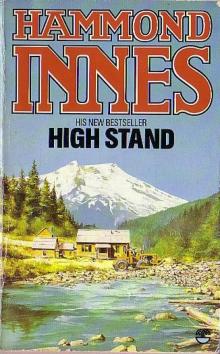 High Stand
High Stand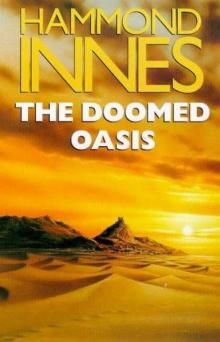 The Doomed Oasis
The Doomed Oasis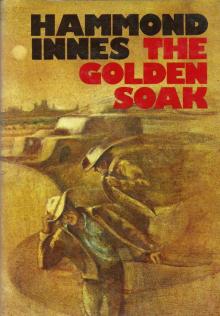 Golden Soak
Golden Soak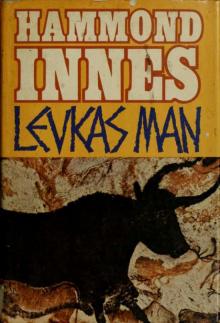 Levkas Man (Mystery)
Levkas Man (Mystery)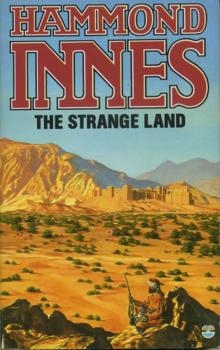 The Strange Land
The Strange Land Dead and Alive
Dead and Alive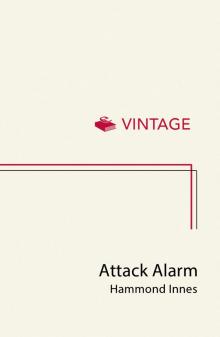 Attack Alarm
Attack Alarm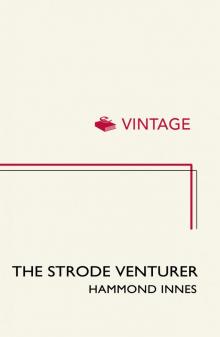 The Strode Venturer
The Strode Venturer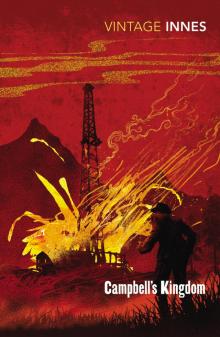 Campbell's Kingdom
Campbell's Kingdom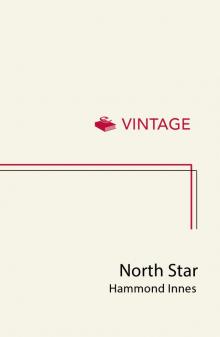 North Star
North Star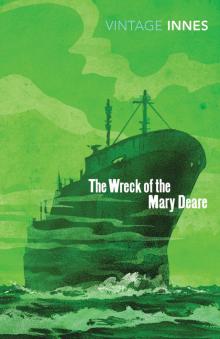 The Wreck of the Mary Deare
The Wreck of the Mary Deare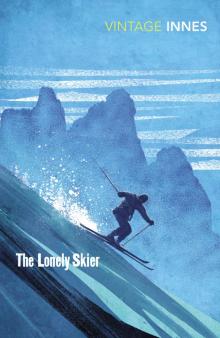 The Lonely Skier
The Lonely Skier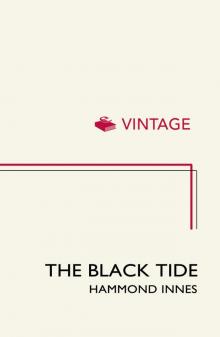 The Black Tide
The Black Tide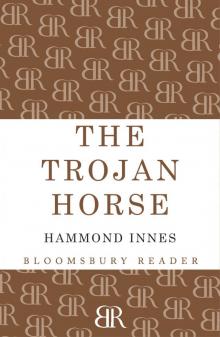 The Trojan Horse
The Trojan Horse Medusa
Medusa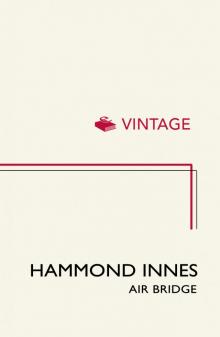 Air Bridge
Air Bridge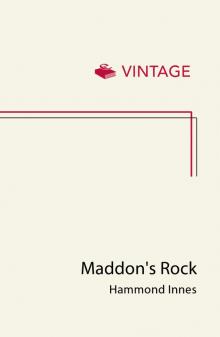 Maddon's Rock
Maddon's Rock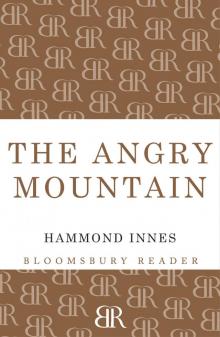 The Angry Mountain
The Angry Mountain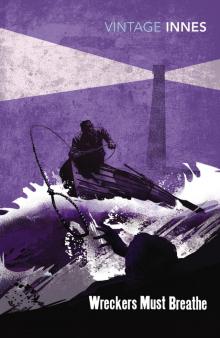 Wreckers Must Breathe
Wreckers Must Breathe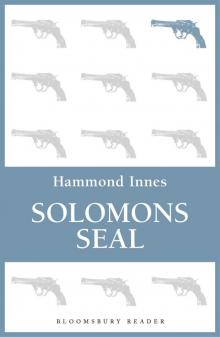 Solomons Seal
Solomons Seal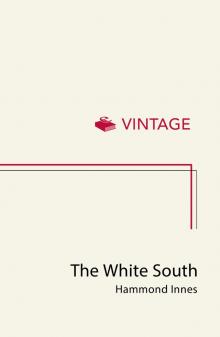 The White South
The White South